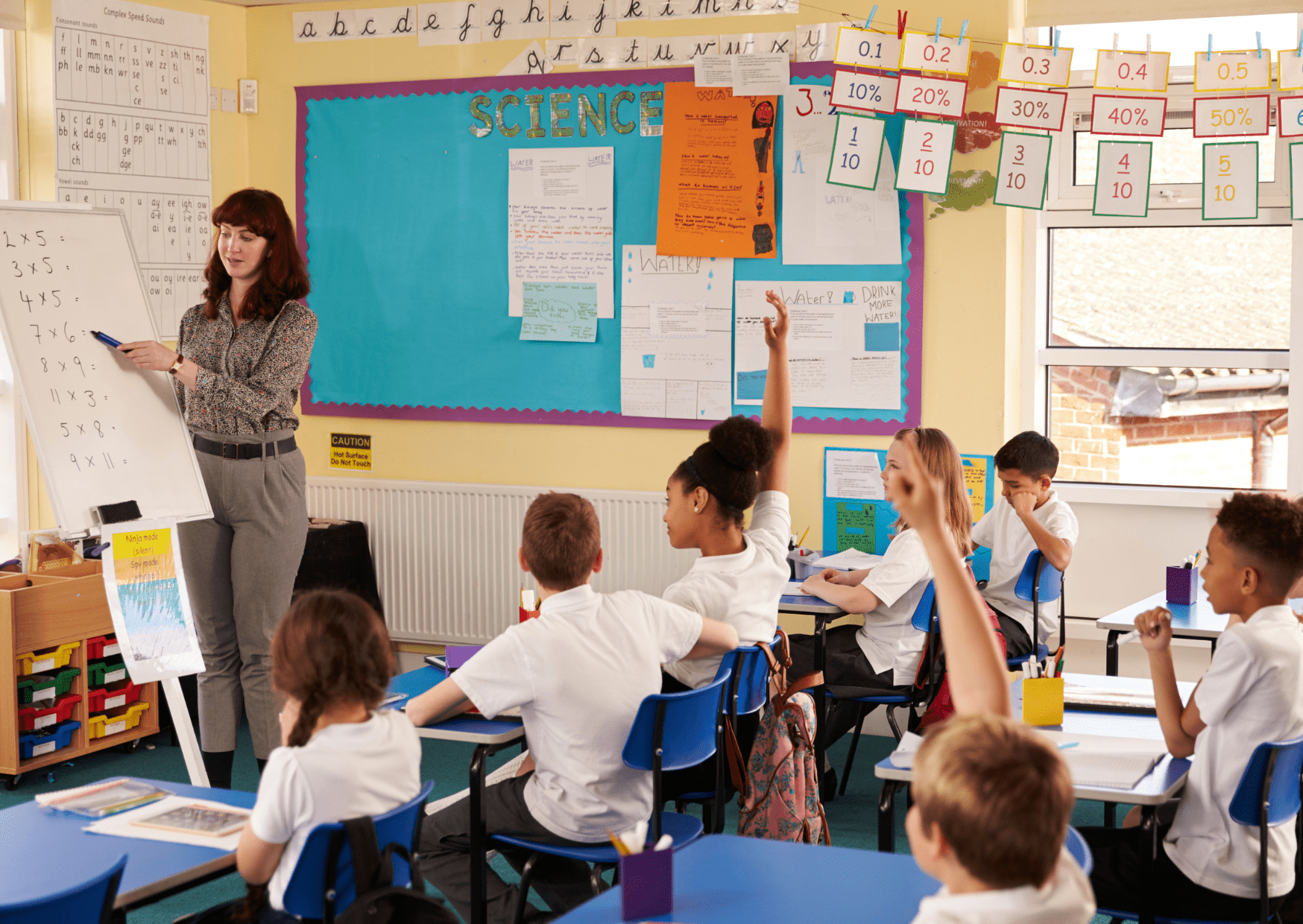
Company News
Key Changes to Ofsted's 2024 School Inspection Handbook
On the 16th September 2024, Ofsted released this years School Inspection Handbook, detailing all of the processes that Ofsted follow to successfully inspect a school.
Schools across the UK will be happy to hear that Ofsted have listened to the criticism and feedback given by the education sector and have made plenty of changes to make the inspection reports a lot fairer and reflective of a school's current situation.
Fewer than 4 in 10 parents (less than 40%) and only 29% of teachers support Ofsted's one-word judgments for schools.
Join Pentagon Play as we delve deep into the 2024 School Inspection Handbook and present you the key changes that Ofsted have made and whether or not this is a positive outcome or a negative outcome.
What Are The Key Changes in the Ofsted Handbook 2024?
Ofsted implemented a wide variety of changes, but the key changes to note include:
- Removal of Single Overall Effectiveness grades
- A new report card system
- An enhanced focus on inclusion
- Changes to ungraded inspections
- A push for greater involvement of school leaders
- Clarification on deferral requests
- Enhanced safeguarding evaluations
- New annual reviews
- Changes for inspection announcements
All of these key changes were made by listening to the feedback from headteachers and school staff from across the UK, aiming to make the inspections less stressful for schools whilst maintaining a strong level of inspections.

It's vital for schools to know these key points as the inspection reports, and process, have completely changed and provide new information to those looking at the document. Let's dive into each key feature and learn how these changes can impact your school.
Removal of Single Overall Effectiveness Grade
One of the biggest criticisms Ofsted faced was how the Single Overall Effectiveness grade didn't provide a fair and accurate assessment of the overall school performance across various different areas. From this, parents couldn't get a comprehensive picture of the school and how it performed in different areas.
To rectify this issue, Ofsted have removed the Single Overall Effectiveness grade from their reports and have created a new method for showcasing a school's performance on 4 key areas. These areas are:
- Quality of education
- Behaviour and attitudes
- Personal development
- Leadership and management
Each of these 4 aspects will be graded by Ofsted instead, providing a more nuanced view of school performance to teachers and parents. This new comprehensive grading system was immediately put into action following the announcement and will be used in the future to grade schools.

For schools who already have a Single Overall Effectiveness grade, they will keep hold of their grade until a future inspection can be carried out. Once the inspection has finished, their old grade will be replaced with the new grading system.
New Report Card System
Being implemented in September 2025, Ofsted announced that a new report card system would be put in place, helping people who view the report to gain more insight and information surrounding a school and it's performance in a variety of different areas.
The new report card system will aim to display the following new information:
- Separate ratings across multiple categories
- How the school supports SEN, vulnerable and disadvantaged children
- Attendance statistics
- Use of pupil premium funding
All of this new information aims to make inspections more effective for driving development too, helping schools understand what areas need improvement on.
The Government has promised to work with stakeholders like Ofsted, educational professionals, and parents to develop the report cards. By doing this, the report cards can be made as transparent as possible and easily understood.

As of right now, the report card system's format and full set of criteria are still being developed, meaning that more information will be available to us in the future. Make sure you re-visit this page regularly to see if any updates have been added!
Enhanced Focus on Inclusion
Inclusion is becoming a key focus for Ofsted, being one of the main "new criteria" added to the new report card system. According to multiple sources, Inspectors will now evaluate whether schools are providing high-quality support for children with vulnerabilities, such as those with a socio-economic disadvantage and special educational needs and disabilities (SEND).
Sir Martyn Oliver, the chief inspector, warned schools that Ofsted would "grade down" schools that refused to take children with SEND or off-roll them. If your school is lacking in SEND equipment or resources, now is the time to start exploring options as this new criteria will be implemented in September 2025.
SEND provision is a major concern for Ofsted. We inspect it: through area SEND inspections, which look at the provision that children and young people with and without EHC plans receive from education, health and social care providers.
Ofsted will also focus on how a school is using pupil premium to support disadvantaged children. All of this information will be available for the public to view and it's really important that schools start to spend their pupil premium wisely.
The inclusion criteria of the new report system is viewed highly among parents and other stakeholders of schools. Not only does it show how a school is promoting equality of opportunity and abiding to the Equality Act 2010, but it also shows that the school is actively trying to prepare children for life in modern Britain and helping them understand the importance of British values.
Changes to Ungraded Inspections
Ungraded inspections have undergone a huge change too, aiming to help school's receive a fairer inspection in a wide variety of ways. Some of the main changes include:
- Removal of subject deep dives - ungraded inspections will no longer include deep dives into specific subjects. Instead, the inspector will look at groups of subjects altogether.
- Pre-inspection phone call - Headteachers will now receive an extended phone call with the lead inspector the day before the on-site visit. The call aims to determine the necessary actions during the inspection and gather essential evidence. In addition, focus areas will be agreed by both parties, which aims to combine inspector interests and school priorities.
- More involvement of senior leadership - Headteachers are encouraged to involve other senior team members in the initial phone conversation and throughout the inspection.
- Focus on school improvement - instead of focusing on whether a school has remained the same overall grade, the new ungraded inspection will focus on if a school has "taken effective action to maintain the standards" identified at the previous inspection.
These changes are designed to help make ungraded inspections feel more like monitoring visits, reducing the burden on schools and providing more time for the inspector to understand the school's context and priorities.
Greater Involvement of School Leaders
One of the main problems a lot of schools had with the previous inspection process was how senior leaders weren't too involved in the inspection process, unable to provide additional information and statistics to assist with the inspection.

Due to this, Ofsted have stated in the new handbook that it will encourage more involvement from senior leaders, including CEOs and governors, during inspection team meetings; aiming to foster better communication and understanding during the inspection process.
In addition, headteachers and the senior team will hold a more central role through the inspection process, aiming to shift the dialogue and provide the school a chance to conversate and provide more information surrounding certain areas.
Another exciting addition is how headteachers can now share draft inspection outcomes and reports with the relevant school staff and governors, allowing everyone to understand the current situation.
Ofsted wanted the inspection process to be more collaborative and ensure that school leaders had a greater voice in how their schools are evaluated. From this, they hope that the anxiety that surrounds inspections will be reduced and make the process more constructive and beneficial for schools.
Clarification on Deferral Requests
Deferral requests have always been a grey area for schools as there was no established procedure for delaying an inspection for a more suitable date. Knowing this, Ofsted have provided a clarification on deferral requests and how schools can make a request.

Firstly, schools can request a deferral during the initial notification phone call or at the earliest opportunity afterwards, before the start of the inspection. It's important to note that Ofsted will not normally consider requests received after 4:30pm on the day that the school is notified.
If you wish to make a deferral request, the request should be made to the inspection support administrator or lead inspector. It should be confirmed in writing, preferably by email, as soon as possible. Whilst the request is being considered, the inspection team will continue to prepare.
Ofsted can be quite strict with which requests they grant and deny. The list below shows when Ofsted may grant a deferral to a school if this circumstance has occurred:
- The headteacher or senior management is currently under a police investigation and the Ofsted inspection would compromise the investigation.
- The school has experienced a recent major experience (e.g. a fire, a large scale burglary, serious vandalism).
- The school is due to merge, close or move.
- There are public health restrictions or concerns in the local area.
- At least three-quarters of pupils or staff will be absent for legitimate reasons.
Requests that mention the headteacher being absent on the day or building work is occurring on the day will often be met with a refusal, unless it directly affects the school providing services to pupils.
In cases where an inspection has already started, Ofsted will not normally consider a deferral but may consider pausing the inspection instead.
If you are making a deferral request for an unannounced inspection, your request will be passed to the Ofsted regional director for a decision.
Enhanced Safeguarding Evaluations
Safeguarding has always been an important aspect of a school, with parents wanting to know more about safeguarding policies that have been put in place. With the new report system being worked on, it's known that Ofsted will inspect the safeguarding aspect of a school.
Even though no separate grade will be given for safeguarding, inspectors will judge whether safeguarding arrangements are "effective" or "ineffective", which will most likely impact the grade given for "Leadership and Management".

Ofsted expects schools to have an open and positive culture around safeguarding, which puts the pupils; interests first. Inspectors will consider this culture when forming their judgement on safeguarding arrangements.
Inspectors will gather evidence to reflect the safeguarding procedures through various means, including:
- Reviewing documents like the single central record and referrals to local authorities.
- Meetings with the Designated Safeguarding Lead (DSL).
- Observing day-to-day practices.
- Discussions with staff and pupils.
Judgements are based on a range of evidence now, not single issues, making the safeguarding process a lot more of a holistic approach.
New Annual Reviews
Aiming to work with the government to introduce this, Ofsted will now carry out annual reviews for schools that focuses on three main areas:
- Safeguarding
- Attendance
- Off-rolling
The purpose of these annual reviews is to help consider how schools are meeting their requirements to keep children as safe as possible whilst at school. Currently, there is no specific date of when these annual reviews will be implemented, but we do know that they are planned to be introduced at some point.

Annual reviews will be separate from the regular Ofsted inspection and are speculated to form their own small report. The annual reviews aim to change Ofsted's approach, moving towards more frequent, focused assessments of key areas rather than relying solely on comprehensive inspections.
Inspection Announcement Changes
One of the most anticipated changes for Ofsted to make was surrounding inspection announcements and how they should be changed to reduce stress and anxiety among the school. After hearing the feedback, Ofsted have announced how the inspection process will work:
- Ofsted will now contact schools after 9:30am on Monday mornings to announce graded and ungraded inspections.
- Inspections will then take place over the following two days (Tuesday and Wednesday).
This new change to the inspection announcement process is currently being piloted over the autumn term of 2024 to discover it's effectiveness and to gather feedback from schools.

However, the announcement changes don't apply to all types of inspections. Urgent or monitoring inspections can still be notified on any day of the week and no-notice inspections will still continue to provide a school with a 15 minute notice before the inspection begins.
The Monday notification system allows schools to have some advanced warning whilst preventing any excessive preparation that might distort the normal running of the school.
Why Did Ofsted Make These Changes?
Between the 8th March 2024 to 31st May 2024, Ofsted held the Big Listen consultation. This event was designed to help build trust back between the organisation and the education sector, providing educators the chance to deliver feedback and criticisms surrounding the organisation.
The Big Listen consultation was a response to the tragic deaths of educators, in particular the case of headteacher Ruth Perry. These cases put Ofsted's practices under intense scrutiny and gave the general public a chance to see how the current process was flawed.
We know we need to change, and we are changing. The Big Listen is a vital part of that process, ensuring we hear from everyone with an interest in our work as we seek to improve what we do.
After the Big Listen consultation, Ofsted now had a list of improvements that they needed to implement, which included:
- Reducing the high levels of stress and anxiety associated with the inspections for teachers and school leaders.
- Improving transparency and communication surrounding Ofsted's entire process.
- Considering the impact of the COVID 19 pandemic on schools.
- Provide more nuanced evaluations instead of focusing on a single grade system.
- Address inconsistencies in how inspections were carried out across different regions.
- Modernise Ofsted and make it a fair inspectorate and regulator.
These points are just a few from a huge list that Ofsted received, but Ofsted are determined to improve their current process and make inspections more fair, whilst maintaining a high standard.
Are the New Ofsted Changes Beneficial for My School?
Overall, the general consensus seems to be positive towards this latest announcement, with many educators claiming that Ofsted are taking a step in the right direction. The benefits seem to heavily outweigh the negatives but it's important to note what possible downsides could arise from this new process.
What Are the Benefits of These Changes?
Some of the key benefits a school will notice from these key changes include:
- More nuanced evaluations
- Reduced pressure
- Greater transparency
- Longer notice for inspections
- Improved complaints process
- A cultural change within Ofsted
All of these benefits combined help to make the entire Ofsted inspection process a lot more bearable and less stressful for schools across the UK. The main benefit to arise from these changes is how schools will have more of a say on their inspections and can provide more information to the inspector to make the process fairer.
What Are the Downsides of These Changes?
The downsides are little in comparison to the benefits, but they do raise questions surrounding the new inspection process. Most of the downsides are applied to stakeholders of a school and include:
- Loss of clear indicators for parents
- Reduced oversight of schools
- Uncertainty about how school performance will be communicated with parents and the public
- Possible reduced motivation for improvement
After researching for hours, these were the 4 main concerns that the general population had regarding the new inspection process. Presently, it's too early to tell if these downsides will remain as negatives or if they are mainly general worries.
The Future of School Inspections
In conclusion, the new changes made in the school inspection handbook are a welcome one, with many educators happy and satisfied. But, this isn't the final change. In the future, Ofsted are sure to tweak the new process to try and balance fairness with high-quality of education standards.

Pentagon Play are here to help in any way we can and we'll keep this blog updated as more news is announced over the coming months. We wish the absolute best to all of the schools in the UK and we're sure that this new rating system will be a lot more reflective of your school's ability to foster a great educational environment.






